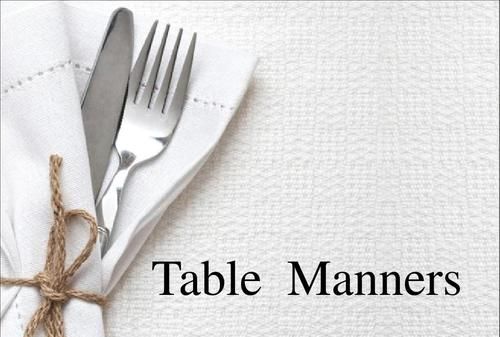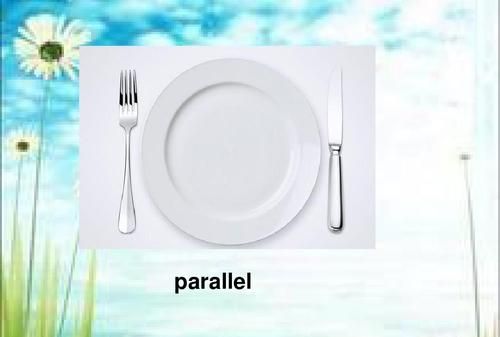本文目录
各国的餐桌礼仪英语作文
各国的餐桌礼仪英语
每个国家都各有其餐桌上的礼仪,那么各国的餐桌英语礼仪是怎样的呢?下面由我为大家整理的各国的餐桌礼仪英语,希望可以帮到大家!

Dining while abroad can feel as though you are tiptoeing around a minefield of unfamiliar rules. Table manners are the ultimate way to show respect (or some accidental disrespect) to your gracious host.
在国外吃饭,宛如蹑手蹑脚的游走在一堆不熟悉的规则中间。餐桌礼仪是对主人展现尊敬(有时反而显现不敬)的最好方式。
Now it's time to learn how to eat. Here are some of the very specific dining do's and don't's from around the world.
现在就来学学如何吃饭吧。下面是全球一些餐桌礼仪,该做什么不该做什么。
Slurp
Slurp your food.
吃东西时砸吧嘴。
In Japan, most commonly when eating noodles and soups, slurping shows your appreciation of the food to the chef. The louder the better! You may also drink directly from the soup bowl -- spoons are uncommon. Furthermore, never cross your chopsticks, lick your chopsticks, or stick your chopsticks vertically into a bowl of rice. It's considered very rude in Japan and many other Asian countries, including China.
在日本,吃面喝汤极其寻常,发出啧啧声是对厨师食物的肯定。越大声越好!你还可以直接端起汤碗来喝汤——调羹反而用的不多。另外,千万别把筷子交叉,舔筷子或是把筷子垂直插在米饭中间。这在日本以及其他亚洲国家包括中国,都是极其粗鲁的表现,
right hand
Eat only with your right hand.
只用右手吃饭。
Sorry lefties -- in India, the Middle East, and some parts of Africa, it is considered unclean to eat with your left hand.
左撇子对不住啦——在印度、中东以及非洲某些地区,用左手吃饭是不卫生的表现。
split the bill
Don't offer to split the bill.
别想着AA制。
In France, splitting the bill is considered the height of unsophistication. Offer to pay the bill in its entirety or someone else will.
在法国,AA制被看成不懂人情世故。要么就请客,不然就等别人买单吧。
Bread
Bread is a utensil.
面包只是食具。
In France, you are supposed to use two hands to eat -- either fork and knife or fork and bread. Bread isn't meant to be an appetizer -- instead it serves to assist the food to the fork. When you eat the bread, tear off a piece of it to eat instead of biting directly into the bread. When not in use, the bread belongs on the table or tablecloth instead of the plate.
在法国,你完全可以用两只手吃饭——用刀叉或者是叉子加面包。面包在这里并不是开胃菜——而是帮助把食物弄到叉子上面的工具。吃面包的时候,慢慢的撕下,千万别直接对着面包咬。不用的时候,面包是放在桌子或是桌布上的,别放在盘子里。
hands
Eat with your hands.
用手吃饭。
In Mexico, it is considered an almost snobby practice to use a fork and knife.
在墨西哥,用刀叉吃饭是十分势利的`表现。
touch
Don't touch any part of your meal with your hands.
不要用手碰到任何食物。
In Chile, touching food with your hands is considered ill-mannered. Yep, even fries! In Brazil, too, pizza and burgers are normally eaten with a fork and knife.
在智利,用手碰食物是非常不礼貌的表现。是的,甚至是薯条!而在巴西亦是如此,披萨和汉堡通常都是用刀叉吃的。
cheese
Don't ask for cheese.
不要要芝士。
In Italy, never ask for cheese if it's not explicitly offered to you. It's considered a sin to put extra cheese on top of your pizza -- and it's even worse to put it on seafood.
在意大利,如果没有给你提供芝士,千万别去要。在披萨上放入多余的芝士会被看成是一个诅咒--如果放在海鲜上就更糟了。
salt and pepper
Don't ask for salt and pepper.
不要要盐或胡椒粉。
In Portugal, if salt and pepper aren't already on the table, don't ask for them. It's considered an offense to the chef's seasoning skills.
在葡萄牙,如果桌子上没有盐和胡椒粉,千万别要。这会被看成是对厨师调味技巧的挑衅。
fork
Don't put food in your mouth with a fork.
不要用叉子把食物放在嘴里。
In Thailand, forks are used to push food into a spoon. Also, it's unusual to use chopsticks -- they're considered tacky.
在泰国,一般都是用调羹吃东西,用筷子都是很奇怪的——会被看成没有教养。
belch
Be sure to belch and make a mess.
记得打嗝和让桌子乱糟糟的
In China, belches are considered an indication of your satisfaction and a compliment to the chef on a job well done. Making a mess around the table serves a similar purpose, and leaving a bit of food leftover shows your host that he or she has provided you with more than enough food.
在中国,打嗝可以体现你的满意,以及对厨艺的赞赏。桌子弄的乱糟糟也可以达到同样的效果,别忘了再剩一点食物,这样主人们就会知道给你们提供的食物够分量了。
yellow flowers
Don't bring yellow flowers to dinner.
不要带着黄花去吃饭。
In Bulgaria, yellow flowers symbolize hatred. Not the message (we hope) you're trying to send.
在保加利亚,黄花意味着仇恨。(我们希望)应该不是你想传达的信息。
lap
Never rest your hands in your lap while dining.
吃饭的时候别把手放在膝盖上。
In Russia, it is considered polite to rest your wrists on the edge of the table -- not on your lap. Also, keep your fork in your left hand and knife in your right.
在俄罗斯,把手放在桌子边搭着是礼貌的行为——但千万别放在膝盖上。另外叉子要在左边,刀要在右边。
individual plate
Don't use an individual plate.
不要自己用个盘子。
In Ethiopia, individual plates are considered wasteful. Food is always shared from a single plate without the use of cutlery -- just hands.
在埃塞俄比亚,每个人单独用个盘子被认为是相当浪费的。通常食物都是放在一个盘子里供大家分享,无需刀叉——手就够了。
;用英语列举一些西方餐桌礼仪的故事
各国餐桌礼仪大盘点
餐桌礼仪指的是你的用餐行为准则,包括如何使用餐具以及如何文明进餐。全
球最大的旅行指南数字出版商
“
孤独星球
”
最近汇集了各类餐桌礼仪,并列出了
餐桌禁忌警示。
美国编辑罗伯特
•
瑞得同自己的团队将各类跨文化书籍中的珍闻
搜集起来,他说:
“
此举用来宣扬旅行的乐趣,有时很有趣,有时也可以增长见
闻。
”
Eating/dining
进餐
Japan
日本
Lonely
Planet: It is “perfectly” okay to slurp when you eat noodles.
“
孤独星球
”
:吃面时
“
滋滋
”
出声是
“
完全
”
没有问题的。
Tradition: Unlike making big noises, slurping mildly is not rude but is a compliment
to the chef. Japanese also say it tastes better if you slurp.
文化传统:
不同于制造高分贝噪音,
吃面时自然地发出轻微的声音非但不粗鲁,
反而是种对厨师的赞美。日本人认为吃面时发出声音,面条的味道会更好。
What else to watch: It’s important to say traditional phrases of thanks before and
after a meal.
其他注意事项:饭前饭后说些感谢客套话是很有必要的。
Eat sushi whole. Dip the fish part rather than the rice into soy sauce.
寿司要一口吃掉。应该用鱼生的部分来蘸取酱油,而不是米饭的部分。
Russia
俄罗斯
Lonely Planet: Your wrists should be placed on the edge of the table while eating,
fork in left hand, knife in the right.
历史老照片不能说的秘密
慈禧军阀明末清初文革晚清
“
孤独星球
”
:用餐时手腕要放在桌子边缘,左手拿叉,右手拿刀。
Tradition: Keep your hands in sight. It is not good manners to rest them on your lap.
Keep your elbows off the table.
文化传统:双手要保持在别人的视线内。把双手搭在大腿上这是不礼貌的,也
不要将肘部放在桌子上。
What else to watch: Leave some food on your plate to show that the host has given
you enough to eat. Or the host will ask if you’d like to have a second helping. It’s
polite to mop up excess sauce or gravy with bread.
其他注意事项:
不要吃光盘中的食物,
以此来表示主人为你准备了充足的食物。
否则主人会问你是否需要再来一份。用面包将余下的酱汁或肉汁抹干净吃掉也
是礼貌的做法。
Portugal
葡萄牙
Lonely Planet: Don’t ask for salt and pepper if it is not on the table. “Asking for any
kind of seasoning or
condiment” will offend the cook.
“
孤独星球
”
:如果桌子上没有摆放盐或胡椒瓶,不能主动去索要。
“
索要任何调
味品或佐料
”
都会冒犯到厨师。
Tradition: Cooks are highly respected in Portugal.
文化传统:在葡萄牙,厨师是非常受人尊重的。
What else to watch: Place your napkin on your lap, and don’t eat with your fingers.
Don’t switch c
utlery between hands.
其他注意事项:
将餐巾铺在大腿上,
不要用手吃东西。
不要双手交换使用餐具。
France
法国
Lonely Planet: never discuss money or religion over dinner. Going Dutch is
considered “the height of unsophistication”.
“
孤独星球
”
:
餐桌上不要讨论金钱或宗教信仰问题。
在法国人眼中,
AA
制会被
视作极其不通世故的。
Tradition: In France,
a meal is like a ceremony. People relish it and make it’s a
special occasion.
文化传统:在法国,用餐就像是一种仪式。人们享受这一过程,并将其看作是
一种特殊场合。
What else to watch: In contrast to the etiquette in Russia, it’s considered good
manners to finish everything on your plate.
其他注意事项:与俄罗斯的餐桌礼仪相反,在法国吃光盘中餐被认为是一种礼
貌行为。
People often cut bread directly on a table cloth rather than on a plate. Tear your bread
into bite-sized pieces before eating. Taking a bite from the whole piece is very
impolite
。
人们通常直接在桌布上切面包,而不是盘子上。吃之前要先将面包撕成小块。
拿着整个面包咬着吃很不礼貌。
Mexico
墨西哥
Lonely Planet: Whenever you catch the eye of someone wh
o’s eating, even a stranger,
it’s good manner
to say “
Buen
provecho”
, which means enjoy.
“
孤独星球
”
:如果你跟某个正在用餐的人目光相遇,哪怕是陌生人,你也应礼
貌地说:
“
Buen
provecho”
,
即
“
祝您好胃口
”
的意思。
Tradition: In Mexico, dining
is more than a meal. It’s a social occasion
- lunches are
rarely quick and suppers can last for hours.
文化传统:
在墨西哥,
就餐不仅仅是填饱肚子那么简单,
更是一种社交场合
——
午餐很少会匆忙的结束战斗,晚饭要吃上几个小时。
What else to watch: Where you sit matters in the country. Before you get seated, look
for place cards, or wait until the host seats you.
其他注意事项:在墨西哥,你就坐的位置很重要。就坐前,要看清座位卡,或
是等主人领你就坐。
And you must say “enjoy your meal” before you leave the table.
离席前一定要说:
“
请慢用!
”
Drinking
饮酒
Lonely Planet has offered helpful drinking tips.
“
孤独星球
”
还提供了实用的《饮酒小贴士》。
America
在美国
If you empty a bottle into someone’s glass, it obliges that person to buy the next
bottle. It’s polite to put the last drops into your own glass.
如果你将瓶中剩下的酒都倒进某人的杯中,那么这个人就不得不再买一瓶酒。
因此礼貌的做法是将最后一滴酒倒入自己杯中。
Australia
在澳大利亚
In a pub,
it’
s customary to buy a round of drinks for everyone in your group. When
it’s your turn say “It’s my round”. They’ll make it up to you when it’s their round.
Don’t leave before you’ve bought a round.
在酒吧里,按照惯例,每个人都要为所有同伴买酒。轮到你时,你要说:
“
让我
来请大家喝酒。
”
轮到别人时,他们也会做东答谢你。如果你想离开,也要等到
请完酒之后再走。
Japan
在日本
Don’t fill your own glass of alcohol, instead, you should pour for others and wait for
them to reciprocate.
不要自己给自己斟酒。相反,你应该为别人斟酒,然后再等别人来为你斟酒。
Russia
俄罗斯
Adhere to the vodka rituals. Vodka is for toasting, not sipping. Men, but not women,
are expected to down shots in one gulp. Never mix vodka with another beverage or
dilute it. And don’t place an empty bottle on the table
- it must be placed on the floor.
要遵守喝伏特加的礼节。伏特加是用来敬酒的,不能啜饮。男士要一饮而尽,
女士则不用。一定不要将伏特加与其他饮料混合,也不要稀释它。不要将空瓶
放在桌上,一定要放在地上。
Sweden
在瑞典
It’s considered impolite to clink glasses unless you say “cheers”.
碰杯被认为是不礼貌的,除非当你说
“
干杯
”
时。

中国传统餐桌礼仪英文
正规的西餐礼仪
Normal Etiquette in West Restaurant
1、预约的窍门。越高档的饭店越需要事先预约。预约时,不仅要说清人数和时间,也要表明是否要吸烟区或视野良好的座位。如果是生日或其他特别的日子,可以告知宴会的目的和预算。在预定时间内到达,是基本的礼貌。
1. Doohickey of Preengage. The more slap-up the restaurant is, the more necessary to preengage. When making a preengage, you have to tell the exact number of person and the time, but also show clearly if you want to a non-smoking or well viewing place. If it is for the birthday or any other special days, you can make them know the purpose and budget. It is bacical politeness that you should arrive in time.
2、再昂贵的休闲服,也不能随意穿着上餐厅。
2. you shouldn't wear the casual clothes in the restaurant even it may be a very expensive one.
3、吃饭时穿着得体是欧美人的常识。去高档的餐厅,男士要穿着整洁的上衣和皮鞋;女士要穿套装和有跟的鞋子。如果指定穿正式服装的话,男士必须打领带。
It is the common sense that one should wear properly when having dinner

英语作文中国餐桌礼仪
英语作文 各国餐桌礼仪:
As we all know,different countries have different table manners.
Today, I’d like to introduce something about Chinese table manners. It’s very necessary to learn table manners in China. In China, table manners are too much.
For instance,you are not supposed to eat with knives and forks. Chinese usually use chopsticks instead. But we are not supposed to stick our chopsticks into our food. But we are supposed to pick up our bowl to eat. And we are supposed to let the old start eating first. And we are allowed to talk at the table. However, you can’t talk too loud and laugh too crazily.
In fact, in China, table manners are not so serious . so , you don’t need to worry about them so much.

译文:
我们都知道,不同的国家有不同的餐桌礼仪。
今天,我想介绍一下中国餐桌礼仪。在中国学习餐桌礼仪是非常必要的。在中国,餐桌礼仪太多了。
例如,你不应该用刀叉吃饭。中国人通常用筷子。但是我们不应该把筷子插进我们的食物。但我们应该拿起我们的碗吃。我们应该让老开始吃。我们被允许在桌子上讲话。然而,你不能大声说话和笑的太疯狂。
事实上,在中国,餐桌礼仪并不那么严重。所以,你不必担心他们这么多。
以上就是关于各个国家的餐桌礼仪英语 ,各国的餐桌礼仪英语作文的全部内容,以及各个国家的餐桌礼仪英语 的相关内容,希望能够帮到您。

